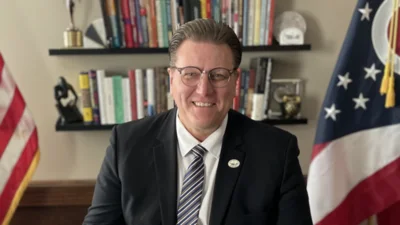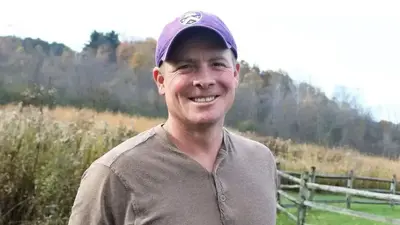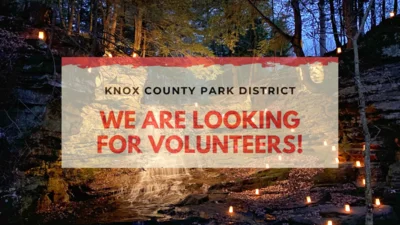Four GOP candidates seeking election to the Knox County Commission debated the industrial solar issue at a candidate question and answer session held Feb. 20 at the Woodward Opera House.
The winner of the race to be decided in the March 19 Republican primary will not face a Democrat rival in the fall. The commission term begins on Jan. 2, 2025.
The candidates are running to replace Teresa Bemiller, who has spent 16 years on the commission.
The central question was whether to impose an outright ban on utility-scale solar developments or delegate the decision-making authority to individual townships, enabling them to determine whether to designate their areas as exclusionary zones for such projects.
The issue has come to the forefront of local politics after the Knox County Commission granted Austin, Texas-based Open Roads Renewables the ability to build an industrial solar facility using 1,500 acres of farmland in Clinton and Miller Townships.
Barry Lester, sales manager at Mansfield Motor Group, aligns with the stance against utility-scale solar and has been visiting the county’s townships to discuss their efforts to create exclusion zones to industrial solar development.
So far 10 of the county’s 22 townships have adopted resolutions against industrial solar.
“I have opposed solar since the beginning of my campaign in October,” he said.
Lester cited concerns about the financial stability of solar companies, potential environmental hazards and inadequate provisions for decommissioning.
“I'm going to give you three letters, LLC. If you do not know what LCC stands for, look it up tonight. This is a harbor for a company to file bankruptcy at any time. All these solar companies are LLCs,” he said.
Lester questioned the payoffs to neighbors living near the solar facilities.
“The other thing I will ask you if it's such a great idea, why are the solar companies offering $10,000 to $15,000 to a neighbor next to somebody who wants to do solar as hush money?” he said. “What's your first clue there, okay. Here's $15,000. Keep your mouth shut. Here's some hush money because we're going to put solar all around you. $15,000 will never cover the damage that you're going to receive next to a solar field with erosion or possibly toxicity.”
Lester also raised questions about the long-term viability of solar projects and urges vigilance against what he perceives as detrimental impacts on local communities.
Jeffrey Harmer, a Danville police officer, advocated for empowering townships to make localized decisions.
Harmer, who has spent 25 years as the General Manager of the Apple Valley Property Owners Association and as president of the Knox County Board of Health, emphasizes the importance of decentralizing governance and enabling communities to tailor regulations according to their unique needs and concerns.
“I'm so in favor of empowering townships at a greater level so that they can make those decisions for their community and grow it up, up the ladder as opposed to receiving a dictatorial direction sometimes,” he said.
Jennifer Snow, a real estate agent and owner of Mister Builder and Mister Electric, underscored the need for improved communication between county officials, townships and residents to anticipate and address issues surrounding utility-scale solar projects.
“I feel like if we would have had better communication, we would have seen this coming and we could have protected it kind of ahead of time,” Snow said.
“Ohio doesn't get a lot of sun, so we know that it's money driven. And as the other candidates have said, these big investors are coming in.”
She is advocating for greater education on conservation practices and emphasizes the importance of protecting farmlands from the influence of profit-driven investors.
“These companies are going to come in, they're going to get all the grants, they're going to get the tax credits. And like Barry said, they're going to disappear, and then they're going to leave the farmer just sitting with all of the mess. And he can't he can't use his field,” she said.
Scott Zimmerman, Owner of Complete Maintenance LLC, champions property rights and emphasizes the importance of local decision-making.
“Since I signed my first petition and I picked it up, I have been for property rights. Now, when I tell people I'm for property rights, they immediately say that I am pro-solar. That is not true. I am for the person having the property rights,” he said.
Still, he lauded recent efforts by multiple townships to assert their autonomy by voting to become exclusionary zones for utility-scale solar projects.
Zimmerman attributes the contentious nature of the debate to federal government intervention and subsidies that distort market dynamics.
“This whole thing, I believe, has morphed so bad because we got the federal government sticking their nose in there and subsidizing things that would not stand on their own,” he said. “I have a small business. There's no one subsidizing me. And if I fail, I fail. So that is where I stand on that.”
Altogether 21 out of 22 townships in Knox County are rumored to be considering resolutions against solar installations, catalyzed by Lester's advocacy.
As township resolutions gain momentum, Lester warns that failure to heed public sentiment could have serious political repercussions for elected officials.
The contentious debate in Knox County over industrial solar escalated after a Nov. 30 event hosted by Knox Smart Development at the Knox Memorial Theater.
The forum aimed to facilitate informed dialogue on land use and solar development's impacts, underscoring the importance of empowering citizens with facts.
At the event, attendees were presented with a discussion involving Brown County Soil and Water Conservation Board Aubrey Bolender who warned against adopting industrial solar.
Brown County banned industrial solar after experiencing problems with large scale solar projects.
“For a county like Knox County, if you are looking to preserve and protect your county, then you really need to not allow solar,” Bolender said. “And if you look at the counties that have banned solar, they are counties that have been affected by construction.






